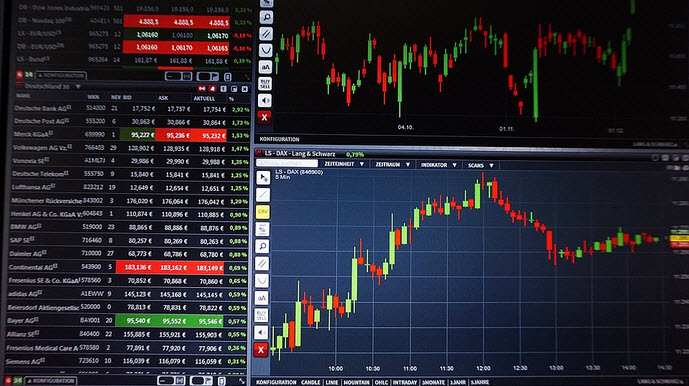
Welcome back! I hope that you enjoyed reading the previous steps and the concepts that I covered. In this step, I’ll be covering more interesting and fun topics than the previous steps (First Step, Second Step and Third Step). Yes, I am going to talk about the financial market and provide insights on how you can grow your savings. This is the money making step that will either determine if you’re going to be a future millionaire or not. So sit back, relax and start your saving journey with me.

Is investing The Same As Gambling?
In my opinion, investing is the almost like gambling. It’s educated gambling. Wait, don’t close your browser yet, give me a couple of sentences and I’ll explain why in a moment. When you invest, you’ll have taken some sort of risk regardless of the investment (bonds, preferred shares, common shares, real estate, etc.) as there is no such thing as a risk-free investment. Of course, a number of risks that you take for an investment, it will be correlated to the potential return. Hence, the lower the risk of an investment, the lower the earning potential. The higher the risk, the higher the earning potential – just like gambling in a casino. When you are gambling at a casino, you’re playing against the House and unfortunately for you, the House will always have more advantages than you, their odds of winning will also be higher than yours and you can’t increase your odds of winning (legally). However, in the financial market, you can increase your odds of winning easily and I’ll show you how in this post.

How To Increase Your Odds Of Winning When You Invest?
When you are gambling at a casino, the House always has the advantage and their odds of winning is more than 50%, which means that your odds of winning are less than 50% – putting you at a disadvantage. In a casino, there are strictly winners and losers most of the time. On the other hand, in the financial market, it doesn’t have to be that way and there are potentials to have all winners and no losers. Everyone in the financial market can increase their odds of winning without doing illegal activities. In the casino, the longer you play, the lower your odds of winning will be. However, in the financial market, the longer you play, the better your chances of winning. That’s why time (or time in the market) is one of the most important factors to growing your savings. Here is an interesting statistic based on a post from A Wealth Of Common Sense on the probability of making money if you invest in the S&P 500 index. If you invest in the S&P 500 index, your chances of making money are 86% over a 5 year continuous investment period. Your chance increases to 94% over a 10 year continuous investment period. And finally (drum roll please), your chance increases to 100%, that’s right, 100% over a 20 year continuous investment period. Now, are you interested in betting in the financial market casino for the long term yet?

What Investment Strategy Should I Use?
There is a myriad of investment strategies out there and for the average person, it’s very confusing, complex and hard to understand. I have heard of investment strategies such as Contrarian Investing, Seasonality Investing, Technical Analysis, Momentum Investing and Value Investing just to name a few. However, the average investor need not understand how to apply any of the investing strategies that I mentioned previously to make money (though it’s recommended that you should at least have some working knowledge of what they are). All they need to understand is to buy and hold, and dollar cost averaging their investments. One of the most effective buy and hold investors out there and he doesn’t need any special introduction, is the one and only, my idol, Mr. Warren Buffett. His investment holding period is almost forever. If you are interested to expand your knowledge, I’d recommend “The Intelligent Investor” for your leisure reading. This book was written by Warren Buffett’s mentor, Benjamin Graham. It gives you really good insights into why people should buy and hold and ignore the daily fluctuation of Mr. Market.

Novice Investors
Let’s say that you suddenly got a light-bulb moment after reading the first three parts of this series and you are now motivated to start saving for your first million dollars. You want to make the $340 monthly contribution, but how do you to get that 7.5% annual compounded return? The easy answer is to buy low-cost index funds as a starting point. For Canadians, there are two low-cost index funds, the TD TSX index fund with a management expense ratio (MER) of 0.33% and the TD U.S. Index Fund with a management expense ratio of 0.35%. These two are the lowest fee mutual funds out there in the market and they allow you to contribute as low as $25 per month with no transaction fees, perfect for the novice investors with a small amount of money to invest. As for my American friends, I heard a lot of my fellow personal finance blogger peers recommend the Vanguard index fund family. Based on the info on the Vanguard site, they are one of the lowest fee mutual funds south of the border, but the funds do have a minimum starting investment of $3,000. By keeping your money in an index fund and contribute on a regular basis, your investment will grow exponentially over the long-term.

Somewhat Experienced Investors
Once you have accumulated a few years of investment experience, built up your financial knowledge and grow your investment to more than $30,000 or so, it’s time to move away from the mutual funds. Even with the lowest fee mutual funds, it still can’t beat the low fee index Exchange Traded Funds (ETF). The two Canadian index ETF that are similar to the TD mutual funds are: XIC – iShares Core S&P/TSX Capped Composite Index ETF with an MER of 0.06%, XSP – iShares Core S&P 500 Index ETF (CAD-Hedged) with an MER of 0.11%. For our friend south of the border, once again the Vanguard Index ETF will be sufficient. The 0.25% per year in management fee may not seem like a huge difference, but over a 40 year period, that can cost you at least 10% (=40 * 0.25%) of your total investment. So instead of having $1,000,000 by the time that you’re 65, you may end up with only $900,000. Every little bit counts when it comes to compounding your money.

Do I Need To Have A Brokerage/Trading Account?
When you are just starting to invest, the answer is no for a few reasons. The first reason is: you’ll be buying only mutual funds, so you don’t need a trading account. Most financial institutions offer no fee RRSP or TFSA accounts that you can invest in mutual funds with no fees. Secondly, most Trading accounts offer by investment brokerages or banks tend to have annual administration fees if your account value is less than a certain amount or you don’t conduct X number of trades. It’s really important to minimize or eliminate fees as much as possible so that you can maximize the growth of your savings.

When Should I Open A Brokerage/Trading Account
There is no right or wrong time to open a brokerage account. However, I’ll recommend that you start conducting your research when you start to invest and open a brokerage account once you’ve reached the somewhat experienced level mentioned above. To get you started, you can check out these brokerage reviews from Money Sense and Million Dollar Journey. For my American readers, you can check out this amazing, thorough and unbiased investment brokerage comparisons research at Reviews.com. How I wish that they can do the same for Canadian brokerages as the time and effort that the Reviews.com team is unsurpassed.

Shouldn’t There Be Fixed Income/Bonds In My Portfolio?
For most experts, the recommendation is to allocate a certain percentage of your portfolio to fixed income or bonds. This can range from 10% to 50% of your portfolio depending on how risk adverse you are. There’s nothing wrong with that. However, with an investment horizon of at least 25 years to 40 years, you’ll be giving up quite a bit of return at the beginning. Also, the long horizon allows investors to afford a bit more risk (remember, if you stay in the market index funds for 20 years, there’s a 100 chance that you’ll end up with more money). If you’re still not convinced and still want to have part of your portfolio in fixed income or bonds, there is an alternative – pay off your personal debts. By paying off personal debt such as your mortgage, the rate of return is pretty much a guaranteed interest rate on your mortgage, which acts like fixed income/bonds.
My Two Cents
Whether you’re trying to lose 10 pounds, start a business, build a deck or saving a million dollars (or two), the key to achieving results is to improve your knowledge and investigate the success factors that improve your chance of reaching your goals. By knowing the success factors, tailoring your actions and behaviours to be in-lined with the success factors will keep you on-track and eventually completing your goals.
In The Fifth Step To Saving A Million Dollars, I’ll provide insights on how to grow your savings using real estate and leverage.


 About Leo
About Leo
This is really informative! I guess I should start investing and save my first million dollars soon 😛
@Janice, the sooner your start, the more time your money has to grow and the sooner you’ll be on your way to saving a million dollars.
Hey Leo,
Awesome post, lots of good information you put in there! Investing and gambling are not the same thing; when you invest, you buy things tangible which have value and can improve over time. Usually with gambling, the odds are against you.
Thank you for the tips on my site. Looking forward to reading more of your content!!
Hi Erik,
I do agree that investing and gambling are not the same. I was just trying to be a little cute with my analogy. The point that I want to make is, when you invest, there are ways that you can increase your chance to make money, while gambling, you can’t. Thank you for dropping by and sharing your thoughts.
Another useful article from you. Thanks, Leo. I’m trying to make my money grow by investing but don’t want the risks! Yes, as you can tell, I am still searching.
Hey Emily,
I understand how you feel regarding taking risks when investing as I have family members that are very risk adverse. The most important thing is to select an investment that let you sleep soundly. It doesn’t matter how much potential an investment has, if it’s keeping you up at night, it’s not the right investment for you.
This is really interesting! I’m so not in the place to invest anything right now but I’ve always believed this was the route I wanted to take once I have enough saved up.
@Adriana, believing that you can increase your wealth is half of the battle. Taking action and starting early is the other half. You don’t need to save up to invest, you just need to get in the saving mind set and develop the saving habit. The sooner you start, the more time your money has to grow.
Yeah sometimes I believe that investing (money wise) is like gambling – it needs courage and adrenaline rush. But always be wise and know your moves like playing chess.
@Blair, Investing is only like gambling if you don’t know what you’re doing. The first step is to expand your knowledge and learn from successful investors. You don’t have to create your own investment strategy, just copy from the investors that fits your own need. I copy from Warren Buffet.
Yes I agree. There is no such thing of zero risk investment.
@Shini, even though all investments carried a certain level of risk, we can manage and lower the risks that we take by doing our research, increase our financial knowledge and diversify our assets.
I love that we read the same people. Ben Carlson is great and really opened up my eyes to some really interesting points about the stock market. I definitely agree that it’s legalized gambling and can definitely get you in trouble if you don’t know what you’re doing. But it’s a great way to build wealth if you are patient and grow slowly grow your positions.
@MSM, thanks for recommending another author to me, I’ll definitely check it out to further expand my financial knowledge.
In my view, when you’re investing, if you are not doing your research and just blindly follow tips from some hot shot that your just saw on TV is definitely gambling (I myself was guilty of that when I first started investing and bought into a stock that was pumped up by some BS fund manager and lost the majority of my money in that investment). However, I strongly believe that if you know what you’re getting into and have an investment plan, then your chance of succeeding will greatly increase.
Thanks for your great tips Leo! We can start by saving small and slowly become something big!
@Sharon, that’s correct. Every investor gotta start with something. No matter how small the investment is, the fact that you’ve started means that you’ve now in the game and overtime, your money will grow. Welcome the the Million Dollar Journey and we look forward to hearing more of your stories in the near future.
Wow thanks for the tips, I kind of like to read and explore more articles here. Very engaging indeed.
@Kelly, I feel flattered and honoured to have received this complement. One of my goals for blogging is to engage people and provoke to them think about their personal finance. Hopefully, my posts are engaging and motivating enough to get you started to save for your million dollars.
Thanks for the post. An ignorant person (such as myself) have always had doubts whether to invest or just save like the plain Joe. Now I know more – learn as you wrote in the post is the key.
@Rawlins, as the the wise mr Warren Buffett preached on his Secret Millionaire Club cartoon investment series, “The more you learn, the more you’ll earn.” So it’s never too late to start learning and invest. You just need to start somewhere :).
I like your comparison between gambling and investing. And those are some awesome statistics on your chances of winning by simply investing in the S&P 500. Too many people are scared to invest. Especially the younger millennial crowd who mostly only remember two severe crashes. I think those stats would be very eye opening to many who think investing in stocks is no better than gambling.
@GFY, I think that some people are scared because they read too much into the daily news and not knowing enough about the long term statistics and potential of the stock market. Most people avoid investing in the stock market because they think that their principle are not protected. However, if they know that if you invest in an index such as the S&P 500 over a 20 year period and you are pretty much guarantee to make money, that’s pretty much a guarantee of your principle to me.
good tips. now to dig for more money to invest
@Isaac, The key to long-term saving is to plan it into your every day finance. Thanks for dropping by.
Nice tips as always. wish we all save up and become a millionaire soon
@Rane, you don’t need to wish to become a millionaire. You can do it yourself. Just take the first step and keep on saving regularly and your money will grow.
This is very informative! I’ll keep your tips in mind.
@Aliza, I am glad that this post resonate with you. Thank you for dropping by and sharing your thoughts.
These are really impressive ideas in about blogging. You have touched some nice factors here. Any way keep up writing.
Thanks GAP discount. Your feedback is definitely providing me a great deal of motivation to produce more posts similar to this.
really need to face the risk before invest! Planning is quite important step before investing,thanks for the tips!
Another great post Leo. The casino always takes my money, the market has been nice to me. Great point on the management expenses. Would be great for me to switch our sons resp to a index fund.
You made a great point that I want to highlight “It’s really important to minimize or eliminate fees as much as possible so that you can maximize the growth of your savings.”
I’d say about 90% of my friends get this wrong and think all mutual funds are the same, it’s crazy. I’ll stick to my low-cost Vanguard index funds and reap the rich profits. Great article!
@Brian, yes, management fees can eat into your savings over time. A 2% fee may not seem like much for a couple of years. However, over a period of 10 years or more, it can be very costly. I am glad that you have figured out the low-cost options. Welcome to the I $aved $5K personal finance community by the way.